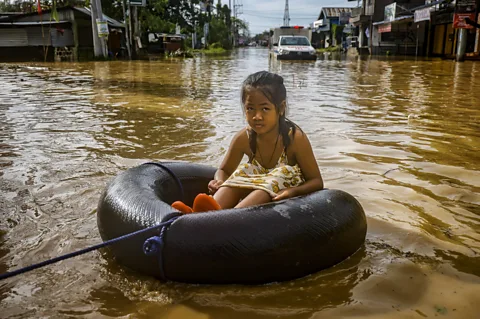What if polluters footed the climate bill?
 Ezra Acayan / Getty Images
Ezra Acayan / Getty ImagesShould rich countries and fossil fuel companies pay for the climate losses and damages they have caused?
There have been a huge number of deadly weather events in 2024. Floods, heatwaves, droughts, storms and wildfires have wreaked havoc on climate vulnerable countries including India, Brazil, Nigeria, the Philippines, and through much of West and Central Africa, claiming lives and destroying homes and livelihoods.
Climate change is making severe events more frequent. Another country to face huge climate damage in recent years: Pakistan. In August 2022, the country was devastated by catastrophic flooding.
The unprecedented monsoon rains killed more than 1,500 people and left the inundated country with economic damages exceeding $30bn (£27bn). Within a month, a scientific study had concluded the high rainfall was "likely increased" by climate change.
The link between greenhouse gas emissions and extreme weather events already happening today is now well established. Events such as Pakistan's floods, Madagascar cyclones and Somalia's drought are becoming more intense and more frequent due to climate change. They have led to death and destruction and left countries facing immense economic damages, plunging them into debt and diverting funds away from other critical areas, such as healthcare and education.
What's more, these impacts are only set to get worse. If global temperatures were to rise by 2.9C, the average GDP of the world's 65 most climate-vulnerable countries will fall by 20% by 2050 and 64% by 2100.
The US states making polluters pay
In May 2024, Vermont became the first US state to require oil and gas companies to pay for the climate damages they have caused, after g the Climate Superfund Act into law. The law mandates polluting companies to be financially able for their share of climate impacts. New York is currently deliberating a similar mechanism, which would charge fossil fuel companies $3bn (£2.3bn) a year for 25 years to pay for climate damages.
The discussion of who should pay for climate losses and damages has become a major geopolitical issue and is expected to be high on the agenda at the Cop27 climate talks in Sharm el-Sheikh, Egypt, in November.
By 2030, vulnerable nations are likely to face $290-580bn (£260-520bn) in annual climate "residual damages" – damages that cannot be prevented with measures to adapt to climate threats. By 2050, the total cost of loss and damage could rise to $1-1.8tn (£890bn-1.6tn).
UN Secretary General Antonio Guterres, who has become increasingly more outspoken on the injustices of climate change in recent years, has described the climate crisis as a "case study in moral and economic justice". He argues "polluters must pay" because "vulnerable countries need meaningful action."
As such climate threats become a larger part of our lives, many argue that the countries and companies responsible for the pollution in the first place should be the ones footing bill.
So what if we lived in a world where polluters really did pay for the climate damage they have caused? How much would they need to cough up, and would these payouts signal the end of the fossil fuel industry? Would this funding ever be able to alleviate the harm done? And could it mean the world's most vulnerable countries recover from climate disasters and adapt to looming threats?
Responsibility for climate change can be seen on several different levels – the actions of governments, companies, communities and individuals can all be linked to emissions.
A study published earlier this year by Dartmouth College in New Hampshire, in the US, provided the first assessment of countries' liability in fuelling the climate crisis. It concluded that emissions from the US, the world's largest historical emitter, cost the world more than $1.9tn (£1.6tn) in climate damages between 1990 and 2014. The next four largest emitters – China, Russia, India and Brazil – caused a further $4.1tn (£3.6tn) in global economic losses in the same time period. Combined, these losses are equivalent to around 11% of yearly global GDP.
"We show that there is a scientific basis for [climate] liability claims," says Justin Mankin, co-author of the study and assistant professor of geography at Dartmouth College. "The science shows that if one country can have detectable damages; one country's foregoing [of] emissions can have detectable benefits. That's really essential… it overturns this narrative of 'what can one country do">window._taboola = window._taboola || []; _taboola.push({ mode: 'alternating-thumbnails-a', container: 'taboola-below-article', placement: 'Below Article', target_type: 'mix' });
